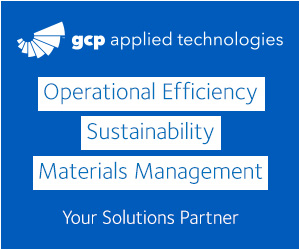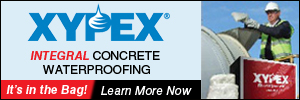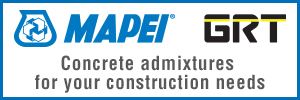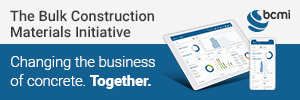 |
||||||||||||
|
||||||||||||
|
Association & Industry News
The estimated ready mixed concrete produced in August 2020 is 35.3 million cubic yards, 7% lower than that in August 2019. The estimated production in the U.S. for 2020 through August is 248 million cubic yards, about 1% higher than that during the same period in 2019. Ready mixed concrete production is estimated from cement shipments reported by the U.S. Geological Survey. More detail is available for NRMCA members here under Production Statistics. With the Global Concrete Summit set to begin on Monday, November 30, this is your last chance to register for what is expected to be the largest virtual concrete event of 2020. It's a perfect opportunity to learn more about the industry and meet the experts across a broad spectrum of topics. You will have the chance to network with fellow academics, students, engineers, architects, contractors, policy makers, public works officials and more. With 16 continuing education credits available for attendees and topics like concrete innovation, resilience, life cycle assessment, low impact development, social responsibility and human health, you can’t afford to miss this event. Register today and make sure to use code BWS40 for 40% off at checkout. For more information, contact Lionel Lemay at llemay@nrmca.org.
Engineering
The NRMCA Concrete Technologist Training and Certification Program was offered between November 2 to 13 to 48 attendees. The course was administered online with 4 hours of sessions each day. Course content, including session recordings, were available to registrants through the NRMCA training portal. The course was taught by NRMCA's Gary Mullings, Karthik Obla and Colin Lobo, and and guest presenters Tony Schlagbaum with MBCC and Eric Misenheimer with Chandler Concrete. Delivering this course online was challenging because of the considerable interaction that occurs in a face-to-face program. Attendees were given quizzes, review questions and polls to garner some interaction and assess their grasp of the content. Overall, the comments from attendees were positive on the online learning experience. Attendees were provided adequate time to study for the exams after completion of the course, which is not typical for face-to-face courses. Exams were administered through the online portal at a scheduled time and for a fixed duration. The certification results have been finalized and are being communicated to attendees. The NRMCA Concrete Technologist Level 2 certification was obtained by 21 people and Level 3 by 15. The attendees are congratulated for going through the course and engaging in the learning process. It is anticipated that another online course will be offered early in 2021; when annouced, the the information will be posted on the NRMCA website. For more information, contact Colin Lobo at clobo@nrmca.org. The National Concrete Pavement Technology Center recently produced a tech brief on reclaimed fly ash. The highway construction industry's utilization of coal fly ash has made many of our concrete pavements and bridges more durable and reduced landfill waste. However, with the shuttering of more and more coal-fired electric power plants, fly ash from coal-fired utilities is in increasingly short supply. Yet high-quality fly ash remains available, deposited in landfills at the time when the coal-fired power plant supply still exceeded concrete industry demand. This tech brief describes how the availability of reclaimed fly ash improves the reliability of the supply chain and how proper harvesting leads to matched chemical and physical properties as well as more consistent quality relative to freshly produced fly ash. This and other informational items are produced as part of a cooperative agreement titled Advancing Concrete Pavement Technology Solutions. Click here to access the tech brief. SEO
Following this month's election, the NRMCA Safety, Environmental and Operations (SEO) Department staff have been working to determine what a Biden-Harris Administration may have in store for the regulatory arena. While we are mainly focused on what regulations may be coming from the different Executive Branch agencies, it’s important to also look to how the incoming 117th Congress makeup will impact the agency efforts. Despite there still being two undecided Senate seats that will likely determine which party holds control over the chamber, any outcome will undoubtably not deliver margins that would allow wholesale approval of large ticket initiatives touted during campaign season. This Senate/legislative roadblock ultimately will create a sort of offramp for many of the potential Biden-Harris Administration proposals, dropping them directly into the regulatory realm. These different initiatives will then be stewarded through the tedious regulatory process before potential finalization by the Environmental Protection Agency (EPA), Department of Energy (DOE), Department of Labor (DOL), Department of Transportation (DOT), Department of Treasury (Treasury) and numerous others. As we aim to read the tea leaves about what proposals may be coming down the pipeline, there are a number of resources we can look toward that provide a decent amount of clarity. Being that Joe Biden is actually a former vice president during the Obama Administration, we’d be remiss if we didn’t dust off the stacks and stacks of proposed and finalized regulations from those two terms to use as a guide. As well, there are a lot of instances of the Biden-Harris team pushing different ideas during the campaign. The Biden-Harris website outlines the incoming administration’s direction based on four pillars: COVID-19, Economic Recovery, Racial Equality and Climate Change. However, one of the best resources might be the list of who has been appointed to the Biden-Harris Transition Team. Currently, the group of people that will be tasked with helping to shift the work of each agency from the Trump Administration to a Biden Administration is made up of what is, in all likelihood, a very deliberate and strategic spectrum of individuals. The team is largely comprised of medical professionals, academics, environmental advocates, union bosses, state elected officials, former government officials and attorneys, each signaling the direction and specific focuses we may see, not only in the next administration, but rolled out in its first few weeks. COVID-19 - It's very likely, that outside of a flurry of nominations to different Cabinet-level positions, one of the first actions a Biden-Harris Administration will pursue will be directing the Occupational Safety and Health Administration (OSHA) to promulgate an Emergency Temporary Standard (ETS) to address the spread of COVID-19, particularly in workplaces. The timing of a directive for this to happen versus its completion will be a guessing game; however it’s likely to be fast tracked. More of a question surrounding an ETS though, is how it will, if at all, be able to be applied and enforced in different states before a pending vaccination is available. Currently, there are a few states that either have their own ETS or specific COVID-19 targeted actions for workplaces. These current examples are likely to be some of the basis for whatever comes out of OSHA. Even more possible is that any OSHA ETS may resemble work the state of California currently has underway on COVID-19 workplace regulations, since the current head of Cal/OSHA is also a part of the Biden-Harris transition team for the DOL. Climate Change and Environmental Issues - Likely action in the short term may also include proposals on climate change or climate change related issues such as sustainability or renewable energy. Over the last couple of weeks there has been a lot of chatter surrounding seemingly atypical and unique methods for pursuing Biden-Harris climate change initiatives. It appears that a Biden-Harris Administration doesn’t just have its sights set on the usual avenues for addressing climate change such as Congress, EPA or DOE, but also through utilizing the Treasury, DOT and the Department of Housing and Urban Development (HUD), among others. These extra focuses hold the potential for leveraging different financial motivators and weaving into policies for cars, trucks, buildings and infrastructure these same themes of climate change, sustainability and renewable energy. Signs of this direction the Biden-Harris Administration may follow are also evident in the transition team and names currently being floated for these Cabinet positions. There is also talk of creating a “climate czar” position reporting directly to the president. The path the administration may follow will probably resemble the route outlined by the Climate 21 Project, a potential Biden climate plan blueprint. Regardless of the direction or focus of such issues, it is likely this will be a continued theme throughout the next administration. These same climate change focuses are sure to expand to discussions and actions on research and development for building materials, energy efficiency, resiliency, furtherance of battery, hydrogen and nuclear technology, and scores of others that may hold opportunities for the industry. Despite the potential for climate change taking center stage in the next administration, we also anticipate some of the issues common to the industry to remain. The fight over the definition of what constitutes a Water of the United States (WOTUS) will probably continue, along with potential limits on discharges to groundwater, endangered species considerations, drinking water requirements, potential constricting of beneficial use of fly ash and increased permitting stipulations. Labor and Safety - Outside of COVID-19 and climate change, there are a number of other issues that have either been given emphasis or it may be implied. This is made very plain, again, by looking at the former vice president’s previous actions and his transition team, when examining DOL and the National Labor Relations Board (NLRB). Expected to receive considerable attention are card check, wage issues, paid sick leave, union organizing, joint employers, data reporting and disclosures, independent contractors, equal pay, ethics training and, as a bit of an outlier, expansion of loosening recreational marijuana laws. Other, more safety tilted, issues may include injury and illness prevention programs (I2P2), union walkaround (inspection) guidance and new standards for backing accidents at workplaces. Transportation - On the transportation front, we suspect regulatory activity to be robust. Pending issues will possibly include COVID-19-related travel bans and/or face covering mandates, Hours of Service (again!), 18-20-year-old drivers of commercial motor vehicles (CMVs), speed limiters, CMV insurance, driver safety fitness determinations, sleep apnea, CMV side and rear guards, CMV reflective tape, automated and autonomous trucks, large/heavy truck emissions and efficiencies, electronic stability control and radio spectrum availability for transportation-related communications, just to name a few. Finally, it’s also important to mention that should the industry face a waterfall of regulatory activity with the next administration, in addition to the Senate there is another potential backstop for limiting and tempering Biden-Harris Administration regulatory expectations and finalizations: federal courts. Over the last four years President Trump has installed a great deal of judges to federal courts across the country; many that are friendly to industry and business interests. As we’ve seen with previous administrations, controversial regulations regularly end in litigation. These same courts with Trump judges are positioned to hear many of the lawsuits that undoubtably will stem from any number of the above-mentioned regulatory schemes. While all of this is really just a snapshot, and by no means exhaustive, of what the next administration may pursue or how it will play out, NRMCA’s SEO team will continue to monitor developments over the coming weeks and months with an eye toward how they will impact the ready mixed concrete industry. As our attention turns to what is to come, we stand organized and prepared to communicate any changes and advocate on behalf of the industry for beneficial outcomes. For more information, contact Kevin Walgenbach at kwalgenbach@nrmca.org.
Pavement
The Virginia Ready Mixed Concrete Association (VRMCA) recently hosted a virtual seminar for the Chantilly, VA, office of GORDON Engineers, reports NRMCA Senior Vice President, Local Paving, Phil Kresge who presented The Quantifiable Advantages of Concrete Parking Lots to 35 attendees. The program was facilitated by VRMCA Promotions Director Hessam Nabavi. Kresge’s presentation highlighted the environmental and economic benefits of concrete pavement with additional focus given to the advantages of using the ACI 330 documents as the standard for concrete parking lot design. Attendees were also introduced to NRMCA’s Design Assistance Program (DAP). Founded in Northern Virginia in 1976, GORDON is a service-disabled, veteran-owned engineering firm that is recognized as a leading provider of professional consulting services to private land developers and government agencies throughout the Mid-Atlantic region. For more information, contact Phil Kresge at pkresge@nrmca.org. Government Affairs
As part of our continued engagement on behalf of the ready mixed concrete industry, NRMCA has participated in introductory and thank-you calls with a number of Members of Congress, both recognizing returning members and congratulating and developing relationships with incoming members. Among those that NRMCA has engaged with are House Transportation and Infrastructure Chairman Peter DeFazio (D-OR), Reps. Jason Smith (R-MO), Kelly Armstrong (R-ND), Salud Carbajal (D-CA) and Reps. Elect Cliff Bentz (R-OR), Marianette Miller-Meeks (R-IA), Ashley Hinson (R-IA), Randy Feenstra (R-IA), Young Kim (R-CA), Michele Steel (R-CA), Jay Obernolte (R-CA) and Senator-elect Cynthia Lummis (R-WY). For more information, contact Andrew Tyrrell at atyrrell@nrmca.org. NRMCA and our allied associations continue to urge Congress to pass a critical COVID relief package and to include industry priorities in upcoming legislation. Last week, NRMCA joined members of the Highway Materials Group (HMG) and the North American Concrete Alliance (NACA) in sending Congress letters outlining the importance of moving on a COVID relief package and including industry priorities. The NRMCA Government Affairs team drafted portions of both letters, ensuring the ready mixed concrete industry’s priorities were included – including reforms to the Paycheck Protection Program, expansion of the Employee Retention Tax Credit, liability protections for businesses against unfounded and frivolous lawsuits, and emergency funding to replace lost revenue for state departments of transportation so that they can reinstate canceled and delayed projects. You can read the HMG letter here and the NACA letter here. Among the critical issues demanding congressional action are government funding – which expires on December 11 – and passage of the National Defense Authorization Act. Whether Congress can reach agreement on a COVID relief package remains an open question. Late last week it was reported that President-elect Biden and his team had begun wading into the negotiations, apparently in support of a roughly $2 trillion package, despite Senate Republicans' resistance to anything more than $1 trillion. Senate Republicans have twice tried to advance packages of $500 billion without success. However, it is likely that the president elect will be anxious to “clear the decks” of extraneous items like government spending, NDAA and COVID relief to give him freedom in pursuing his own legislative agenda. Both chambers are out of session until November 30. For more information, contact Andrew Tyrrell at atyrrell@nrmca.org. 2021 January 22 – 29, 2021 Online Course March 23 – 26, Boston November 9 – 11, Dallas Learning & Development
Dispatchers Training Forum scheduled for January 11- 18, 2021, is now open for registration. Rest assured, this once-a-year class is the same curriculum with the same instructors teaching live. The same learning materials will be mailed to attendees before the online class starts. Attendees are expected to free their time over the four days, for a set time between January 11-15. The required class exam will be Monday, January 18. This virtual opportunity is a terrific way to support those dispatchers who normally cannot travel. Key skills covered are:
Registration cutoff is December 31, so please do not delay. Click here to register, more information and staff contact. Plant Manager Certification Course - Due to the December 2020 already being sold out, NRMCA has added another Plant Manager Certification course for January 2021. After a live kickoff session on Friday, January 22, registrants can access lectures 24/7 between January 22-28. Questions will be entertained live on January 28. The required, two online exams will take place January 29, from 11 a.m. to 3:15 p.m. Eastern time. Attendees and their supervisors should plan for an intense learning week, just as if this class was face-to-face. The Plant Manager Certification course has become the industry knowledge standard for plant managers and operators. Content ties knowledge to application in product knowledge management, plant safety, environmental regulations, plant operations and ready mixed concrete industry business principles. This is the certification class required for Army Corps of Engineers and U.S. Naval Facilities Engineering Command projects. Click here to register and detailed information. Calendar
*Please note that e-mail and direct links to each event listed below can be accessed from NRMCA's Web site. November 30 - December 10, Online Conference and Expo December 8 – 11, Online Course December 11 – 18, Online Course *Sold Out December 14 – 18, 2020 Online Course December 15, Online Course |
||||||||||||













_Sept13.jpg)


